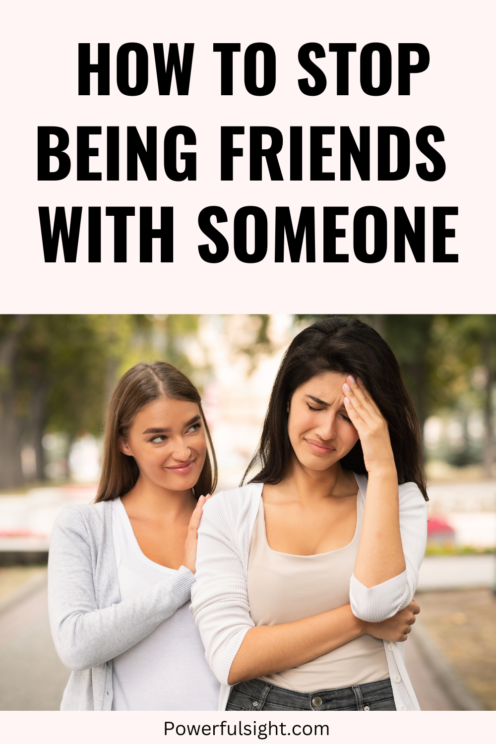How to stop being friends with someone
1. Have an Open and Honest Conversation
The first step in ending a friendship is to have a direct and honest conversation with the person.
Choose a time and place where you can speak privately and calmly.
Express your feelings and concerns, and be clear about your decision to end the friendship.
Avoid blaming or attacking the other person, and instead focus on your own needs and boundaries.
2. Set Boundaries
If you decide to maintain some level of interaction with the person, it’s important to set clear boundaries.
Determine what type of relationship, if any, you’re willing to have moving forward.
This could involve limiting communication, avoiding certain activities or locations, or only interacting in group settings.
3. Gradually Distance Yourself
Sometimes, a clean break isn’t possible or desirable.
In these cases, you can gradually distance yourself from the friendship.
Respond less frequently to messages, decline invitations to social events, and focus on developing other relationships.
This can help ease the transition and minimize any potential conflict.
4. Avoid Mutual Friends and Spaces
If you share mutual friends or frequent the same spaces, it may be best to avoid these situations for a while.
This can help you create physical and emotional distance from the former friend and prevent any uncomfortable encounters.
Related: Qualities of a good friend
5. Be Firm and Consistent
When ending a friendship, it’s important to be firm and consistent in your decision.
Avoid sending mixed signals or leaving the door open for the friendship to be rekindled.
Stand your ground and be clear about your boundaries, even if the other person tries to persuade you to change your mind.
6. Reflect on the Reasons
Take the time to reflect on the reasons why you’ve decided to end the friendship.
This can help you gain clarity and confidence in your decision, and it can also prevent you from regretting your choice in the future.
7. Seek Support from Others
Ending a friendship can be challenging, so don’t be afraid to seek support from other trusted friends, family members, or even a therapist.
Talking through your feelings and experiences can help you process the situation and move forward in a healthy way.
8. Avoid Confrontation or Drama
When ending a friendship, it’s important to avoid confrontation or drama.
Resist the urge to engage in heated arguments or to try to “get the last word.” Instead, maintain a calm and respectful demeanor, even if the other person becomes emotional or defensive.
9. Be Prepared for Emotional Reactions
Ending a friendship can be a highly emotional experience for both parties.
Be prepared for the other person to react with sadness, anger, or even disbelief. Remain calm and reiterate your decision, but avoid getting drawn into a back-and-forth.
10. Don’t Feel Guilty
It’s important to remember that you’re not responsible for the other person’s feelings or reactions.
While ending a friendship can be difficult, don’t feel guilty for prioritizing your own well-being. Trust that you’re making the right decision for yourself.
11. Focus on Self-Care
During this transition, make sure to prioritize your own self-care.
Engage in activities that bring you joy and relaxation, and surround yourself with supportive loved ones. Taking care of your emotional and physical well-being can help you navigate this process more effectively.
12. Avoid Mutual Acquaintances
If you have mutual acquaintances or connections, it’s best to avoid discussing the end of the friendship with them.
Maintain a professional and neutral demeanor, and refrain from badmouthing the former friend. This can help prevent the situation from escalating and causing further drama.
13. Don’t Engage in Retaliation
It can be tempting to want to “get back” at the former friend, but engaging in retaliation or revenge is never a good idea. This can only lead to more negativity and conflict. Instead, focus on moving forward and healing from the experience.
14. Give Yourself Time and Space
Ending a friendship can be a significant loss, and it’s important to allow yourself time and space to grieve the relationship. Don’t rush the process or expect to “get over it” quickly. Acknowledge your feelings and allow yourself to move through them at your own pace.
15. Consider Closure
In some cases, it may be helpful to seek closure with the former friend.
This could involve a final conversation, a letter, or even a symbolic gesture, such as returning any shared items or memories.
However, only pursue closure if you feel it will genuinely help you move forward, and be prepared for the possibility that the other person may not be receptive.
Conclusion
Ending a friendship is never easy, but sometimes it’s necessary for your well-being.
So, do not be afraid to take the step to unfriend your friend.
Any friendship that does not add value to your life should be put to an end.
Save the pin for later
